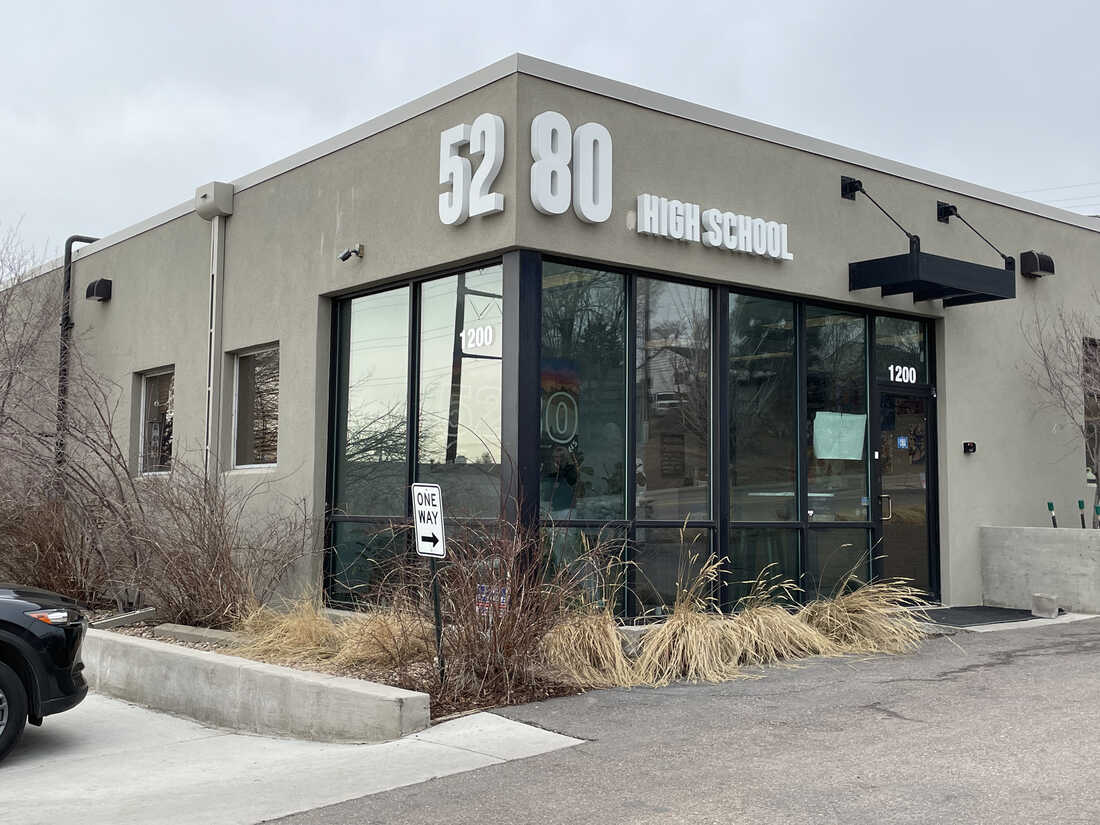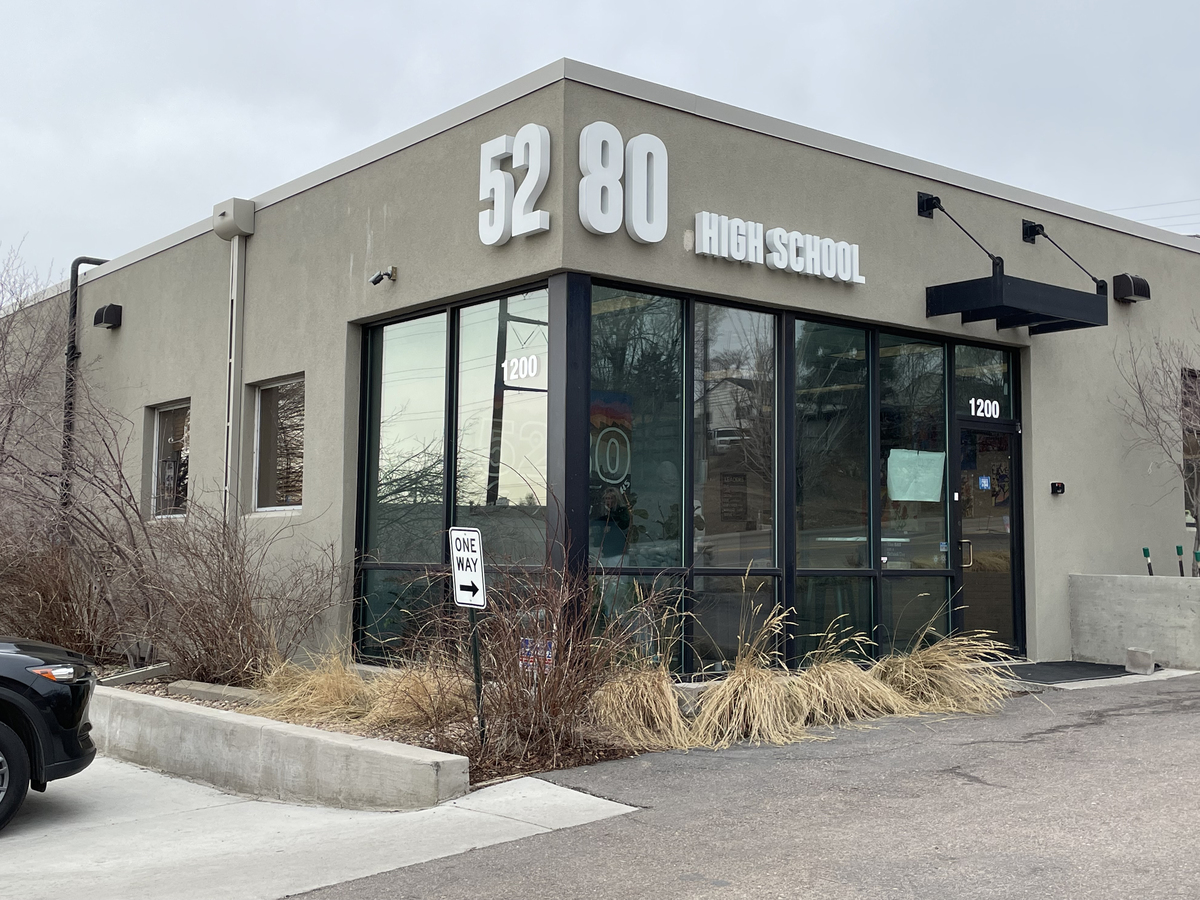
[ad_1]

5280 High School in Denver is considered one of 43 secondary faculties within the U.S. with a program designed for college kids recovering from substance use dysfunction and associated psychological well being issues.
Stephanie Daniel/KUNC
disguise caption
toggle caption
Stephanie Daniel/KUNC

5280 High School in Denver is considered one of 43 secondary faculties within the U.S. with a program designed for college kids recovering from substance use dysfunction and associated psychological well being issues.
Stephanie Daniel/KUNC
Every weekday at 5280 High School in Denver begins the identical method.
Students in restoration from drug and alcohol dependancy collect on the steps of the college’s indoor auditorium to debate a subject chosen by workers members. One latest morning, they talked about psychological well being and sobriety. A teenage boy wearing tan corduroys, a black hoodie, and sneakers went first.
“I didn’t want to have, like, any emotion,” he stated. “So I thought, like, the best way to, like, put it down would be to do more and more and more drugs.”
A classmate stated she began doing medication for enjoyable after which received hooked. Another pupil stated his dependancy negatively impacts his psychological well being. A 3rd introduced an upcoming milestone.
“In, like, two days, I’ll be six months sober,” she stated, as her classmates cheered.
The college students attend Colorado’s solely restoration highschool — considered one of 43 nationwide. These faculties are designed for students who are recovering from substance use dysfunction and may also be coping with associated psychological well being issues. The Denver college opened in 2018 as a public constitution college that right this moment enrolls greater than 100 college students.

One of these cheering classmates was sophomore Alexis Castillo, 16, who listened supportively throughout that latest morning assembly. She is in restoration for alcohol and fentanyl addictions. Several of her pals attended the college when she enrolled throughout her freshman yr and initially cherished it. But after some time a few of Castillo’s pals left and he or she grew disillusioned. She stopped going to class and wasn’t motivated to work her restoration steps.
“They give you a lot of accountability,” she stated. “That was not something I wanted.”
Castillo relapsed and faculty staffers helped her get into rehab. Three months later she was again on the college, in restoration and able to do the work.
The college’s mission is to assist youngsters study to dwell a substance-free life whereas receiving an training. This contains attending restoration conferences and wellness actions, and taking conventional highschool lessons like English, math, and Spanish.
“They can go on to college or a career and really handle anything that life throws at them,” stated 5280’s founder and government director, Dr. Melissa Mouton.
In 2022, practically a 3rd of twelfth graders and 1 in 5 tenth graders reported utilizing a bootleg drug within the earlier yr, in keeping with a national survey from the Monitoring the Future challenge performed by the University of Michigan Survey Research Center. Those numbers have steadily decreased over the previous 25 years. However, knowledge from UCLA exhibits overdose deaths among teens doubled within the first yr of the pandemic, primarily attributed to the elevated prevalence of fentanyl-laced medication.
The first restoration highschool opened in Silver Spring, Md., in 1979 and comparable packages now function in 21 states. Compared with their friends at common faculties who’ve gone by means of therapy, restoration highschool college students have higher attendance and usually tend to stay sober, and their graduation rate is at the very least 21% increased, in keeping with one examine.

A mosaic within the pc lab at 5280 High School in Denver. Colorado’s solely highschool with a restoration program opened in 2018 as a public constitution college and right this moment enrolls greater than 100 college students.
Stephanie Daniel/KUNC
disguise caption
toggle caption
Stephanie Daniel/KUNC

A mosaic within the pc lab at 5280 High School in Denver. Colorado’s solely highschool with a restoration program opened in 2018 as a public constitution college and right this moment enrolls greater than 100 college students.
Stephanie Daniel/KUNC
“For this particular group of young people who have these disorders, this can be a lifesaver,” stated John Kelly, director of the Recovery Research Institute at Massachusetts General Hospital. “It can help them create a social norm of recovery.”
There are three parts to efficient drug and alcohol therapy, in keeping with Dr. Sharon Levy, a pediatrician and dependancy medication specialist at Boston Children’s Hospital. The first half is medical, which incorporates seeing a physician, drug testing, and utilizing drugs like buprenorphine to deal with opioid dependancy. The second is emotional help from counseling to handle co-occurring psychological well being issues. And there’s a behavioral part that, for youths, can embody receiving constructive suggestions from mother and father, peer help and restoration faculties.
“Recovery schools offer an opportunity really for peer support and mutual aid in a kind of a supervised and structured way,” Levy stated.
Recovery excessive faculties typically weave parts of therapy into the college day — actions like 5280’s every day restoration program assembly. In the afternoon, the college provides wellness electives reminiscent of non secular ideas and journaling. The college additionally employs a director of restoration and restoration coach to work with and counsel the scholars individually.
Recovery faculties do face challenges. Most are publicly funded constitution or various faculties that carry the next value of teaching college students than conventional faculties do. This is because of a smaller enrollment, the necessity for psychological well being and restoration personnel, increased faculty-to-student ratios, and different elements.
The Denver college enrolls about 100 college students yearly, making it one of many largest restoration excessive faculties within the nation. This yr, the per-pupil value is about $25,000 per pupil however the college receives solely about $15,000 from federal, state, and native funding, in keeping with Mouton. The remaining cash comes from donors.
Given the complicated wants of the scholars, “recovery schools will always be small,” she stated.
Pooling such college students collectively might also increase a priority that college students will set off each other to make use of medication and alcohol and relapse, however, Levy stated, that is a threat with any social interplay.
“So, if you’re in an environment where the recovery is kind of front and center and people are watching and monitoring and supervising,” she stated, “I think that’s helpful for a lot of kids.”
The college in Denver purposely retains enrollment underneath capability so further teenagers can enroll anytime throughout the college yr. A pupil will not get kicked out in the event that they relapse, however there are two necessities: They should need to be sober and attend an out of doors restoration program.
“The No. 1 step is just letting them know out of the gate, no matter what’s going on, that we love them,” stated Brittany Kitchens, the college’s restoration coach. “We are here for them.”
Kitchens teaches college students navigate restoration and regulate their feelings. She likens herself to a corridor monitor, consistently checking in with college students and on the lookout for modifications in habits.
“I tend to be the first kind of line that the kids will come to when they’re experiencing something that is just a little bit too big for them to process,” she stated.
Some of those difficulties stem from traumas college students have skilled, together with intercourse and drug trafficking, and abandonment. Students additionally take care of traumas they’ve induced, Kitchens stated, actions that landed them in jail or on probation.
Kitchens, who’s in restoration herself, shares coping mechanisms with the scholars.
“A lot of times it just starts with, ‘Hey, take a breath, breathe in through the nose and out through the mouth,'” she stated.
Alexis has been in restoration for practically a yr, she stated. The morning conferences the place she and her classmates discuss psychological well being, sobriety, and different subjects are a possibility to construct a neighborhood of pals who help each other, one thing she stated she did not have when she was utilizing medication.
“It’s really hard to get sober young,” she stated.
This article is a part of a partnership that features KUNC, NPR, and KHN.
KHN (Kaiser Health News) is a nationwide newsroom that produces in-depth journalism about well being points. Together with Policy Analysis and Polling, KHN is likely one of the three main working packages at KFF (Kaiser Family Foundation). KFF is an endowed nonprofit group offering data on well being points to the nation.
[adinserter block=”4″]
[ad_2]
Source link